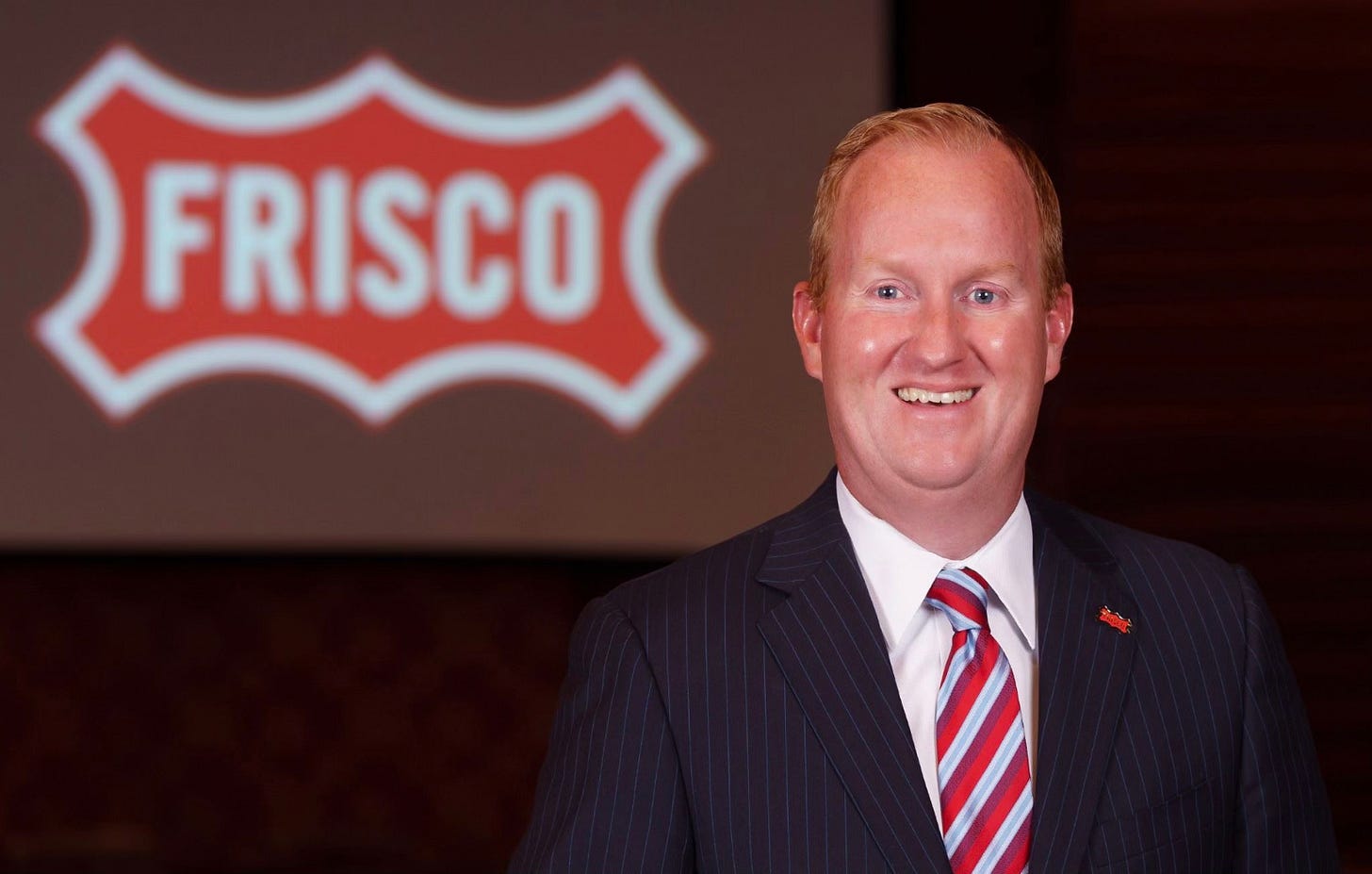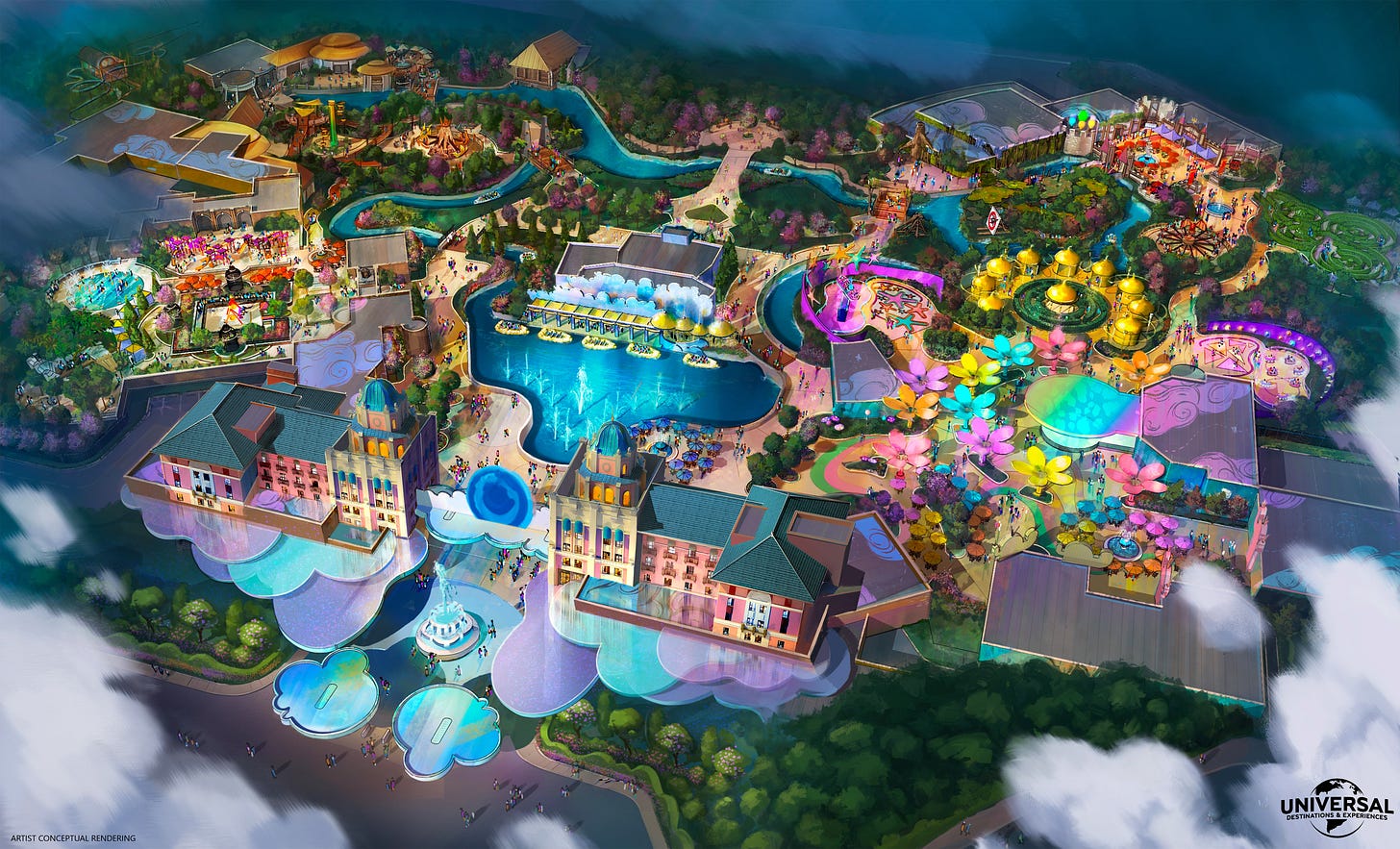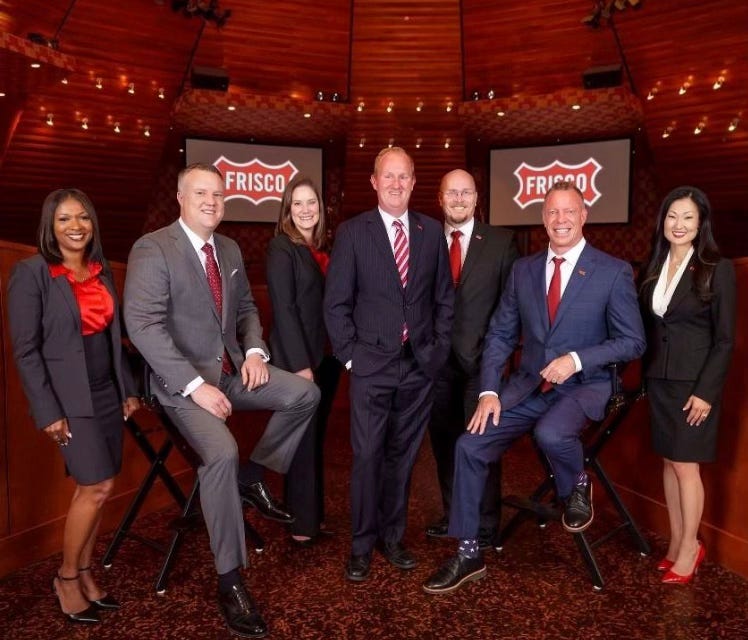Keeping Your Eye on the Ball
City doubles down on vision of sports tourism, produces results that are otherworldly
I thought we’d start Part II of our series on Vision with a reminder of why it’s so important when it comes to effective governing.
Where there is no vision, the people perish.
Proverbs 29:18
I’m not trying to be overly dramatic. Or get too preachy, so if you’re not a person of faith, bear with me for a moment. The Proverbs are believed to have been written by Solomon, the biblical king most famous for his wisdom. As the story goes, Solomon sacrificed to God, who later appeared to him in a dream, asking what Solomon wanted from God. Solomon asked for wisdom to better rule and guide his people. Pleased, God personally answered Solomon's prayer, promising him great wisdom because he did not ask for self-serving rewards like long life or the death of his enemies.1
Or you could just take it from the great outlaw Butch Cassidy.
Solomon successfully ruled ancient Israel (and Butch his Hole in the Wall Gang) because he saw what others could not. He also had the smarts to figure out how to achieve that vision. (As did Butch, up to a point. Things didn’t end so well in Bolivia.)
Solomon also had one more indispensable trait. Hubris. How else do you have 700 wives and 300 concubines?
Vision — and attitude! It’s a powerful one-two punch and aptly describes the attributes of Frisco, Texas. How else would a city in the Dallas-Fort Worth Metroplex think it could win big in sports tourism when neighboring Arlington, as detailed last week, seemed to have cornered that market?
And winning big they are. For the fiscal year just ended, the Frisco Convention and Visitor’s Bureau reports booking an average of 20 meetings/events and 10,614 hotel room nights per month. The CVB, which launched 20 years ago, reports that since 2003 visitors have contributed more than $705 million to the city’s economic base. They estimate around 7 million visit Frisco every year.
That happens because Frisco is one of those high-achieving local governments whose leaders get together once a year to take a break from the daily grind to make sure they focus fully on the long-term goals and objectives needed to achieve a vision. Twenty-plus years ago, at one of those planning retreats, they saw an opportunity to get in the tourism game via minor league sports facilities.
What happens in those visioning work sessions can absolutely change the destination of communities. Never, ever underestimate what can happen when elected leaders step out of the glare of regular meetings to step back and think about the future and how to get there. To reflect on what has been accomplished and to dream of could be. I’ll share what I saw with own two eyes at city council planning retreats in next week’s newsletter.
The leaders in Frisco envisioned what could be, and in 2003, they opened what is now Riders Field and Comerica Center. The former is regularly recognized as one of the top minor league baseball stadiums in America. The latter is the official practice facility and the Executive Offices for the NHL Dallas Stars, and serves as the home of the Texas Legends basketball team, the NBA G League affiliate of the Dallas Mavericks.
A mere two years later, in a public-private partnership, the City opened what is now Toyota Stadium, home of FC Dallas, a Major League Soccer club. The complex includes an additional 17 regulation size, stadium-quality soccer fields for tournaments and practice.
I hasten to add here that getting these kinds of deals done is H-A-R-D. I mean, really hard. There are often brutal, no-holds-barred negotiations, land deals to get done, and usually some kind of rezoning — fraught with potential pushback from nearby landowners — often required for these kinds of unique facilities to become reality.
It would have been easy to rest on its laurels after so much success in a few short years staking a claim to a significant chunk of the sports tourism market in DFW. But that’s not how Frisco is wired, according to Mayor Jeff Cheney.
“This is a can-do city,” Mayor Cheney said. “That's the starting point.”
He says the City hit an “inflection point” in 2011 when Men’s Journal named Frisco the “Top Place to Raise an Athlete.”
“It kind of caught us off guard, but we were excited to get that kind of coverage,” Mayor Cheney said. “And so we had a council work session back then and spoke about that, and I was a young councilmember back at that time. And so the discussion surrounded around, ‘Well, do we want to actually live up to that title and how can we continue to lean into a sports culture?’ And so that’s when we kind of really started saying, OK, we’ve got these facilities. How do we use it for sports tourism?”
And thus began an even more outrageous series of successes.
For starters, they are now home to the FCS Championship — 13 years running. FCS stands for Football Championship Subdivision, which is the second-highest level of college football in the United States. North Dakota State has played in 10 of the last 11 FCS Championships, which are held at 20,500-seat Toyota Stadium. Mayor Cheney said Bison fans now call it “The Migration” when making the annual trip from Fargo to Frisco. Since 2017, the City has also hosted The Scooter’s Coffee Frisco Bowl, an FBS college football bowl game.
Leaning into soccer resulted in a $58 million, 100,000 square foot expansion of Toyota Stadium in 2018 to add the National Soccer Hall of Fame Museum and make other improvements to the facility. The expansion was a partnership of the City, FC Dallas, U.S. Soccer and Frisco ISD.
When the FIFA World Cup comes to North America in 2026, Frisco will be involved in hosting practices and events (as will, naturally, Arlington’s AT&T Stadium.) Did we mention the World Cup is the most watched and followed sporting event on the planet?
Riders Field hosts the Frisco College Baseball Classic, an early season tournament that annually features some of the top college teams in the country.
A Rising Star
And while the Dallas Cowboys play their home games in Arlington, their world-class headquarters and practice facilities are in Frisco. It’s another public-private partnership. Here’s the description of the facility from the city website:
The Ford Center at The Star is a state-of-the-art, 510,000 square foot indoor athletic facility shared by the Dallas Cowboys, the City of Frisco, and Frisco ISD’s eight high schools. The facility features 12,000 folding fixed seats, similar to those found at AT&T Stadium. It houses Frisco ISD events such as football games, soccer games, marching band competitions, commencement exercises and other similar events.
The Ford Center (also known as the multi-use event center) is owned by the City of Frisco, but it is managed by the Dallas Cowboys with the organization paying all maintenance and operation costs.The Star site covers 91 total acres of land.
If you want to know just how cool this place is, check out this drone tour put together for the HBO series Hard Knocks. It’s spectacular.
What’s truly amazing — I mean, jaw-dropping, you-gotta-be-kidding, no-way-in-hell amazing — is how quickly the deal came together between the Cowboys and the City.
“The first night that we talked about the Dallas Cowboys and it being a potential opportunity, to announcing a signed deal was something like between 60 and 90 days,” Mayor Cheney said. “It’s hard to buy a house in that period of time.”
Can do, indeed. It’s gotten to the point where the more difficult the deal, the more appeal it has to Frisco.
“The harder the project, the more aspirational, the more we want to chase it,” Mayor Cheney said.
The hardest so far, according to the mayor, was the 2018 bombshell announcement in the golf world that the PGA of America would relocate its headquarters from Palm Beach County, Florida, to Frisco. The PGA of America anchors a 600-acre, mixed-use development with an initial investment worth more than half a billion dollars. There are two world-class golf courses at the Omni PGA Frisco resort. A 2017 study by Hotel & Leisure Advisors estimated an economic impact of more than $2.5 billion.
That estimate looks to be conservative. Mayor Cheney said, since the announcement, there’s been $10 billion worth of announced commercial development near the PGA Frisco site.
“These things create major economic engines,” he said.
The PGA of America will initially employ at least 100 people at its Frisco-based
headquarters.

Under the agreement with the City, two PGA Championships, two KPMG Women’s PGA Championships and potentially a Ryder Cup will be held in Frisco. The Senior PGA Championship was held in Frisco this past May and was a hit with the locals.
“It felt like the entire community took a week off of work to go volunteer at that event,” Mayor Cheney said. “That was an unexpected surprise.”
Going Beyond Sports
The hits just keep on coming. In January, Universal Resorts & Experiences announced it had selected Frisco as the site of a new concept park for families with young children, in addition to a 300-room hotel. Here’s what it might look like.
Naturally, many folks in Frisco were excited about the potential of another attraction in the community. And, naturally, folks who lived near the theme park voiced concerns, most notably over traffic but there were also concerns about increased crime in the area.
Those are typical for a project of this magnitude. For an overview of how the City responded to those concerns, have a look at this webpage dedicated to the Universal project. There are links to a Traffic Impact Analysis, as well as a comparison chart that shows how expected traffic at the theme park compares to, say, a Costco or HEB grocery store. (Smart!) Over the course of three public hearings, the folks at Universal listened to nearby residents and took steps to mitigate noise and indicated they were working closely with the City to ensure traffic flowed away from existing development. The company put together its own FAQ on the impacts of its Frisco project.
To my experienced eyes, it certainly looks like the City and Universal listened and addressed the concerns reasonably and responsibly. Longtime readers know I’m passionate about thoughtful, well-planned citizen engagement.
But Mayor Cheney said a group rose up and used the Universal project for a “political agenda.”
“And they were very loud,” he said. “And so that would have been very easy for a council to say, you know what? I’m going to vote against this because the noise is too loud.”
I’ve probably been to around 700 city council meetings in my life. I’ve seen it over and over how elected officials need to steel themselves when citizens show up angry and then direct that anger at them during a public hearing. Given that we operate as a democracy, shouldn’t they be responsive to their citizens?
Of course they should. But they also need to remember that those who show up at City Hall don’t represent the entire community. In our interview, Mayor Cheney recalled a city council planning retreat from a dozen or so years ago when he was new to elected office. The facilitator, Mike Mowery of SGR2, exhorted councilmembers “to not govern to the vocal minority.”
Mike’s advice went something like this: If you have one person show up at a council meeting to speak against something, you've got an “issue.” If you got two, it’s a “crisis.” And if three people show up, it’s a “movement.” When you’re up on the dais, that’s certainly what it feels like. Of course, they may be the only three people in the community with the same opinion on the topic at hand.
When voting for the Universal zoning, Mayor Cheney said he recalled Mike’s counsel to not cave to the vocal minority. What made it more difficult was the fact he would be up for re-election in a few short months. But the right thing to do was stay true to the city’s vision, and Universal’s project fits perfectly into Frisco’s initiative — as expressed by the City Council at it’s January 2022 winter retreat — to embrace change and invite possibilities.
“I knew (the vote) would impact my re-election,” Mayor Cheney said. “I had to lean on (Mowery’s) advice, which is, I know this is the right thing for my community. I know it’s going to be a wonderful asset. And the day it opens, everyone’s going to be really excited and happy.”
The Benefit to Locals
Lest you think the lion’s share of benefits of these facilities go to the private partners involved, Mayor Cheney notes there are significant benefits for Frisco residents.
The most obvious is that local student-athletes grow up competing at world-class facilities — the idea that sparked Frisco’s major push into sports tourism, you’ll recall.
“We partner with our school district in all these facilities,” Mayor Cheney said. “We joke that when they go off to college, our student-athletes (play) in stadiums and facilities worse than what they played at in high school.”
The most widespread benefit to local residents is that all those visitors and all that commercial growth contributes to the local economy, which means folks outside of Frisco help pay for amenities and services inside of Frisco.
When speaking to local groups, Mayor Cheney conducts what he calls an “implied value” exercise. He’ll share a list of nearby cities and a list of property tax rates. He’ll ask which tax rate goes with which city. Most folks will assume Frisco, with great amenities, has the highest tax rate while cities that don’t have as many amenities are among the lowest.
“Of course, the purpose of the exercise is that it’s actually the opposite,” Mayor Cheney said. “Frisco actually by far has the lowest tax rate because while we have higher perceived service and amenities, it’s because those (major developments) are actually paying for these other things (by) diversifying the tax base.”
Frisco’s property tax base has nearly tripled over the past 10 years, from $16 billion to more than $42 billion.
You have to educate folks about the benefits of that type of development, and they do that exceptionally well in Frisco. Go check out the Public-Private Partnerships page on the City website. Comms Director Dana Baird and her team do truly impressive work in making it easy for anyone get an overview — as well access to all the many details — about every one of these deals.
But it starts with elected leaders, and one of my goals at GGF is to inspire the right kind of leadership for local governments. We need visionary, forward-thinking leaders like the ones in Frisco.
Mayor Cheney and his peers are the kind of elected officials we need more of. He understands his role — and the role of the staff that serves the Council and the community.
“At the end of the day, our role as the elected officials is effectively we're a board of directors,” he said. “We’re setting vision and policy. It’s the city manager and his team that actually have to go out and execute on those kinds of things.”
And boy have they executed in Frisco. When you have that kind of elected leadership working with a top-notch staff and a clear vision for the community, you reap the kind of success that would make old King Solomon blush.
Onward and Upward.
Full disclosure: I do consulting for SGR. Mayor Cheney had no idea of my relationship with SGR when he recounted this story.







Breathe deep of that government goodness, Dr. Hall!
Talk about vision!
The vision of Frisco Mayor Jeff Cheney
is so huge it has expanded my awareness
of what a leader's vision can BE.
I will be thinking about this story for a long time.
Cheney's vision and how he and his people achieved it
is extremely inspiring.
An allegory for leaders-in-the-making,
and for creative town citizens.
The entire story takes my breath away.
Mayor Cheney having the strategic intelligence
to SEE all the exciting domains Frisco could establish strongholds in.
(He figured that OUT?!?!)
The beauty of the spectacular facilities themselves.
(On those tours--Am I dreaming?)
The incredible speed of Frisco's success.
(Are you kidding...THAT fast???)
The HUGE benefits to the Frisco youth
of these tremendous accomplishments.
(Just imagine the young talent being developed
right there in their own home facilities!)
But the part of your story that inspired me the most, Will,
is where you share:
Can do, indeed. It’s gotten to the point where the more difficult the deal, the more appeal it has to Frisco.
“The harder the project, the more aspirational, the more we want to chase it,” Mayor Cheney said.
WOW.
That declaration was like long-lasting nitrous oxide to my engine :)